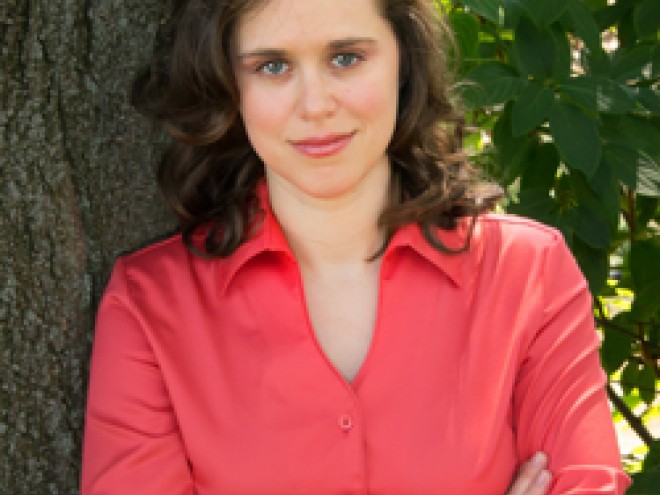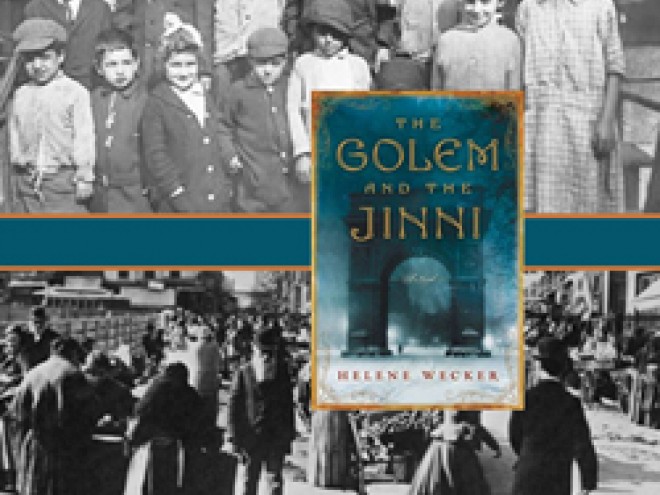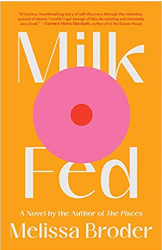It’s going to be hard not to compare Helene Wecker’s first novel, The Golem and the Jinni, to the fantastical (and fantastic) book Jonathan Strange & Mr. Norrell. Both are rare finds in the contemporary book world: elegant, anachronistic stories of magic and miracles in a historical-fiction world more accepting of it than our own, set against a lush narrative voice that’s equally as magical as its characters.
The book starts with the birth of one of its characters and the rebirth of the other. In a European shtetl, a young man pays an old rabbi to create a bride for him — a female golem who will do whatever he says. En route to their new life in America, the young man falls sick and dies, and the golem finds herself launched into a world she barely understands. As a golem, she’s supposed to fulfill the wishes of her master — but without a master, she’s confused and directionless, and trying to cope with her arrival in turn-of-the-century New York City. Across town, a Syrian tinsmith accidentally frees a jinni hundreds of years old who’s equally unaccustomed to the customs of the New World, and is equally uncomfortable with the demands imposed upon him by his own new master.
Wecker delights in her own worldbuilding, creating magical rules and natural laws and then twisting them, crafting a story that’s equal parts folktale, fable, and adventure. Like its long-lived protagonists, the book takes a slow-burn approach to its plot. In the wrong hands, it could be torturously boring. In Wecker’s, it’s exactly the opposite, and we find new things to savor on every page.
A Conversation with Helene Wecker
Helene Wecker is the author of the The Golem and the Jinni. The debut novel follows the converging stories of two mythical creatures who must find their place within turn-of-the-century immigrant New York.
Dani Crickman: I love the simplicity of the title The Golem and the Jinni and how well it encompasses the story. How did you come up with the title? Were there any others you considered?
Helene Wecker: The title never was anything other than that in my mind, from the first twelve pages that I wrote which was back when I was at Columbia and it was for a workshop. I thought it would be a children’s book or a novella or something short, and it had that fairytale feel to it. It was meant to have a simple title, like those of the stories from The Thousand and One Nights.
When it started to become apparent that this was going to become a long, more adult book, and it was going to take me a while to write it, I had a number of people tell me, “You’re going to have to change the title before it gets sold. No one knows what a golem is, not as many people know what a jinni is as you think.” There were a couple of times when I started to think of other titles, and I just couldn’t come up with anything. Everything was too vague or metaphorical. Later on, my editor, my agent, and I were all working on titles, and we still couldn’t come up with anything. For some reason, this book was just completely resistant to any other title. So that was what we ended up going with. It’s a conundrum we resolved by not doing anything about it in the end.
DC: The golem and the jinni have believable personalities that are both admirable and flawed, as well as opposite yet compatible to each other’s. Was it difficult to find characterizations for them that worked?
HW: Yes, it was. During the seven years it took me to write the book, it went through a number of iterations, and the characters themselves went through a number of iterations. Especially the golem. At first she was very much more like an automaton. She had her own free will, but she had much less insight into other people. Her ability to hear other people’s desires and fears was added in three or four years after I started writing the book, because it was clear that she did not have enough agency. She did not interact very well with other characters because she didn’t understand them well enough, and because of that she wasn’t as interesting a character herself. It was like watching a robot move around and have to learn about people, which could be an interesting story, but it wasn’t enough. Not for this.
The jinni was also hard to pin down because I wanted him to be arrogant and mercurial without being a total jerk. I wanted him to still be someone a reader could relate to or be interested in. With him, it was finding that balancing point. He was fun to write, in that it’s sometimes fun to write the bad boy, but I didn’t want to go to nuts with that.
They both took some fine-tuning, and it helped to think of them in relation to each other. They weren’t created in a vacuum. I was thinking, How am I going to get them to spark off each other? What about the one is really going to piss off the other?
DC: You said the book took seven years to write. Was that because an extensive research went into it?
HW: I did a lot of research. The first few years, it was fifty-fifty research and writing. There were so many topics to research. I knew something about the Lower East Side Jewish community fabled in song and story and movie; a lot of that I’d received from being part of Jewish culture. But I knew almost nothing about the Syrians who were living in New York at that time, and it wasn’t until I started to do the research that I realized that they were for the most part Arab Christians, they weren’t Muslims. That was a surprise. Then I had to research Maronite Catholics and Orthodox Christians from what is now Lebanon. My head started swimming trying to deal with all this and learn about it. In the flashbacks, there’s Bedouin culture, and that was something else I had to look up.
I read so many books. I read Call It Sleep by Henry Roth, which was written in the 1930s about a Jewish boy growing up in the 1890s, and got a lot of details from that. I trolled through The New York Times’s online archives and the New York Public Library’s online photo archives. The fact that all of that information is online right now…I don’t know if I could have written this book ten years ago.
At one point, I wrote a backstory for the jinni that got completely out of control. It became this whole extended thing where he disguised himself as human and rode with a caravan for weeks. I realized this tangent had taken on a life of its own and I had to cut it back. I’d lost two weeks of writing and forty pages. If I had known then how much I was going to write and cut! I think about that and laugh. This book was, at one point, seven hundred and some pages long. I tossed everything in there. There were magical amulets, there were magical books, there were three or four other main characters that got condensed down into one person. It was like this spectacular sea creature that just kept growing and growing. It took my agent and later my editor to say, “You could do a lot more with less here,” and they were absolutely right.
DC: What was the most difficult thing for you to let go of as you cut the story down?
HW: There was one scene in particular toward the end that I had always had in my mind, an important moment for Arbeely. The copper flask that the jinni was in had been destroyed and Arbeely had to create another himself out of tinplate and put in the seal that would keep someone inside it. He was doing something he wasn’t even sure he believed would work, it was going to be very dangerous, and he’d have to give all his energy to it. It was going to be this great moment for him, the culmination of everything he’d gone through in the book, but it ended up getting completely cut out.
DC: When I picked up the novel, I expected it to be focused on Judaism and Islam. I was surprised to discover that the jinni in the novel isn’t connected to Islam in the same way that the golem is connected to Judaism. Rather, he’s more broadly connected to Arab culture, Bedouin culture, and the Syrian community, which is a mixture of Christians and Muslims. Was this your first intention?
HW: My very first idea for the book was that it was going to encompass about a hundred years and it was going to be more of a fable, the story of these two creatures who are both living in New York, and who check in with each other every once in a while over a hundred years. It was going to be a very compressed sort of story telling the evolution of the Jewish and Arab communities of New York from the late 1800s to the turn of the twenty-first century. In my original idea, it was the jinni who was going to work at a bakery, making baklava for a hundred years. But that didn’t survive the first workshop session. Everyone said, “You’ve got to slow down, the fun is in the details.”
At the same time, I never really thought of the jinni as particularly attached personally to a religion, because in my mind he was absent of devotion and introspection and contemplation — things that are by nature anathema to him. The religious aspect, the Islam, was going to be drawn out in the supporting cast. Only later did I realize those characters would be Christians and not Muslims. At the beginning, that was a little disappointing to me. I was struck by my own ignorance of the facts, and it meant the story coudn’t be more of an allegory of the current times, of what people think of Jewish and Arab coexistence. I would love to come back to that. If it had been about Judaism and Islam, my main concern would have been keeping from being preachy and beating people over the head with whatever I was going to say.
DC: Characters in the book discuss the nature of faith and superstition, and they all offer different perspectives. What is your perspective? Where do you think the line between the two is?
HW: In writing this book, I took the opportunity to play with this for myself and look at all of the different arguments and perspectives. I think the problem is that I agree with all of them. As is common in Reform Judaism, I grew up with a very strong Jewish identity and almost completely absent Jewish spirituality. What was emphasized was the Jewish life cycle, Jewish history, learning Hebrew, getting bar and bat mitzvahed, the sense of learning to be a Jew in the world, in America — not any sort of faith or belief in God.
In the book, a character asks, “Do you believe in God?” and the person who answers says, “When so many people believe, who am I to say otherwise?” I feel that pretty strongly. I have no authority to say one thing or the other. I love and respect and embrace the conundrum of belief and superstition and faith and the fact that at the end of the day none of us really know.
DC: Does your own personal sense of Judaism manifest in this story?
HW: It does, in the idea of wrestling with questions and being linked to the urge to tell and hear stories. If there is a Jewish part of my soul, that is what that is. That is where the book comes from: wrestling with God, wrestling with the questions of life.
DC: Any hints about what readers might expect from you in the future?
HW: I would love to write something set in the years leading up to and during World War I. I came across a lot of interesting material that was too late for The Golem and the Jinni about what was going on in the US from 1913 to 1917. We were being isolationist toward Europe, but at the same time, the machine age was really beginning. Changes in society and how people related to each other were taking place. That would be a very interesting backdrop to set something against.
The uneasy symbiosis between science and faith is something that also really interests me. There’s this fallacy that people come to that all scientists must be atheists, which seems sad and unnecessary to me. Some of our greatest scientists have been great believers in God and found absolutely no strife about it in their own heads. I’ve had this character in my head: a brilliant scientist who’s a very devout man. I’d like to put him in something, but I don’t know what yet. We’ll see.




